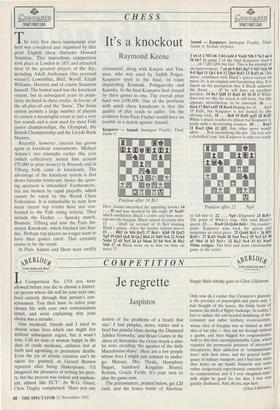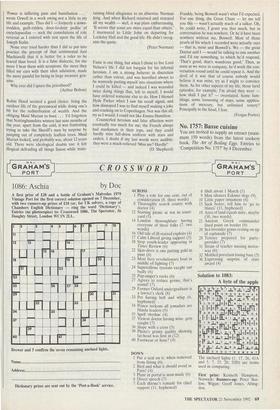COMPETITION
Je regrette
Jaspistos
n Competition No. 1754 you were allowed before you die to choose a histori- cal person whose life will be your next one, lived entirely through that person's con- sciousness. You then have to relive your chosen life with your own consciousness intact, and write explaining why your choice was a mistake.
One weekend, friends and I tried to choose some lives which one might live without subsequent regret, but it wasn't easy. Call no man or woman happy in the days of crude medicine, children lost at birth and agonising or premature deaths. Even the joy of artistic creation can't be taken for granted; as Gerard Benson reported after being Shakespeare, 'I'd imagined the pleasures of writing his poet- ry, but the process was violent and unpleas- ant, almost like ECT.' As W.G. Grace, Chris Tingley complained: 'Have you any notion of the problems of a beard that size? I had pimples, mites, icicles and a brief but painful blaze during the Diamond Jubilee fireworks,' and Brian Coates in the shoes of Alexander the Great struck a simi- lar note, recalling 'the agonies of the daily Macedonian shave'. Here are a few people whose lives I might just consent to under- go: Matisse, Mrs Thrale, Humphrey Bogart, Isambard Kingdom Brunel, Rossini, Gracie Fields. It's your turn to play the game now.
The prizewinners, printed below, get £20 each, and the bonus bottle of Aberlour Single Malt whisky goes to Glen Lillebrew.
Only now do I realise that Cleopatra's glamour is the province of playwrights and poets only. I had thought of the luxury, the frisky bouts of passion, the thrill of flighty badinage. In reality, I had to endure the soft-headed dundering of two corpulent and rather leathery ex-servicemen, whose idea of foreplay was as limited as their idea of fair play — they ran me through without a qualm, and then begged for congratulation. Add to this their incomprehensible Latin, which required the permanent presence of interested interpreters, their addiction to 'compassionate leave' with their wives, and the general inade- quacy of military transport, and I had time more than heavy on my hands. Eunuchs and some rather dangerously experimental cosmetics were no compensation, and if I ever imagined asses milk might be good for the skin,
I was very
quickly disabused. And, oh yes, asps hurt.
(Glen Lillebrew) `Power is inflicting pain and humiliation .. . wrote Orwell in a work owing not a little to my life and example. Thus did I — formerly a down- trodden, guilt-ridden, door-to-door pedlar of encyclopaedias — seek the consolations of role reversal as I entered with zest upon the life of Joseph Stalin.
None ever tried harder than I did to put into practice the precept of that sentimental fool Machiavelli that it is better for a ruler to be feared than loved. It is a false dialectic, for the more I beat them with scorpions, the more they filled my ears with their idiot adulation, made the more painful for being in large measure gen- uine.
Why ever did I spurn the priesthood? (Arthur Bolton) Robin Hood seemed a good choice: living the outdoor life of the greenwood while doing one's bit for the redistribution of wealth. And the obliging Maid Marian to boot ... I'd forgotten that Nottinghamshire winters last nine months of the year; apart from the cold, it was frustrating trying to take the Sheriff's men by surprise by jumping out of completely leafless trees. Maid Marian looked, and probably was, about 12 years old. There were ideological doubts too: it felt illogical defending all things Saxon while main- taining blind allegiance to an absentee Norman king. And when Richard returned and restored all my wealth — well, it was plain embarrassing. `It seems that some are more equal than others,' I murmured to Little John on departing for Locksley Hall and the good life. He didn't recog- nise the quote.
(Peter Norman) Fame is one thing, but when I chose to live Lord Nelson's life I did not bargain for his infernal heroism. I am a strong believer in discretion rather than valour, and was horrified always to be wantonly putting myself into situations where I could be killed — and indeed I was wounded twice doing things that, left to myself, I would have ordered someone else to do. How I blessed Hyde Parker when I saw his recall signal, and how dismayed I was to find myself making a joke and cracking on to Copenhagen. Nor was this all; try as I would, I could not like Emma Hamilton.
Counterfeit heroism and false affection were eventually too much for me; the French always had marksmen in their tops, and they could hardly miss full-dress uniform with stars and orders. I doubt if my last words were audible; they were a much-relieved 'Miss me? Hardly!'
(D. Shepherd) Frankly, being Boswell wasn't what I'd expected. For one thing, the Great Cham — let me tell you this — wasn't actually much of a talker. Oh, he could write, I grant you that much, but in conversation he was nowhere. Or he'd have been nowhere without me, Boswell. Most of those pearls of his which I recorded were actually ours — that is, mine and Boswell's. We — the great Doctor and I — would be talking to one another and I'd say something, to which he'd respond, `That's good, that's wondrous good.' Then, as soon as we were in company, he'd work the con- versation round until he could repeat it. And the devil of it was that of course nobody would believe it was mine, try as I might to convince them. As for other aspects of my life, those lurid episodes, for example, I'm afraid they were how shall I put it? — overstated. Some fum- blings, some loosening of stays, some applica- tions of mercury, but unlimited venery? Principally in the head, I fear.
(Fergus Porter)
No. 1757: Basse cuisine
You are invited to supply an extract (maxi- mum 150 words) from the latest cookery book, The Art of Boiling Eggs. Entries to `Competition No. 1757' by 4 December.











































































 Previous page
Previous page